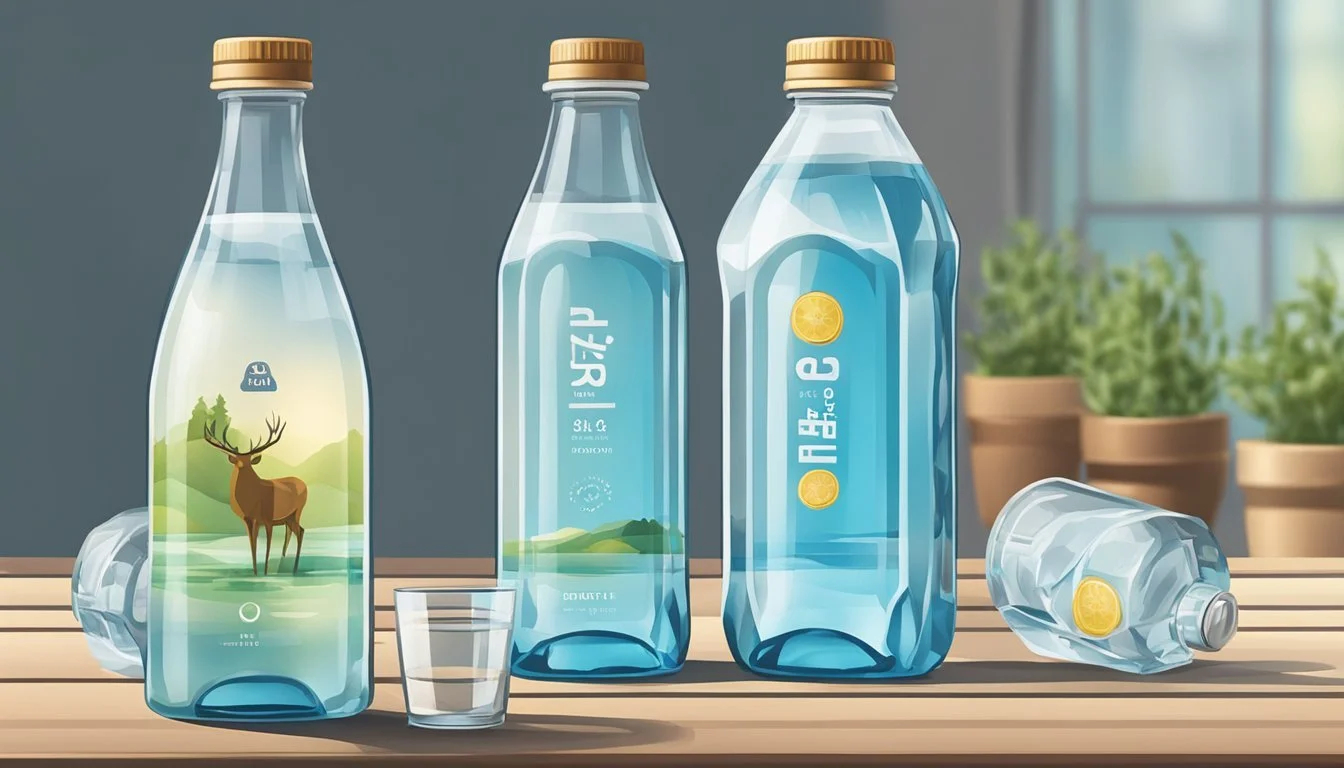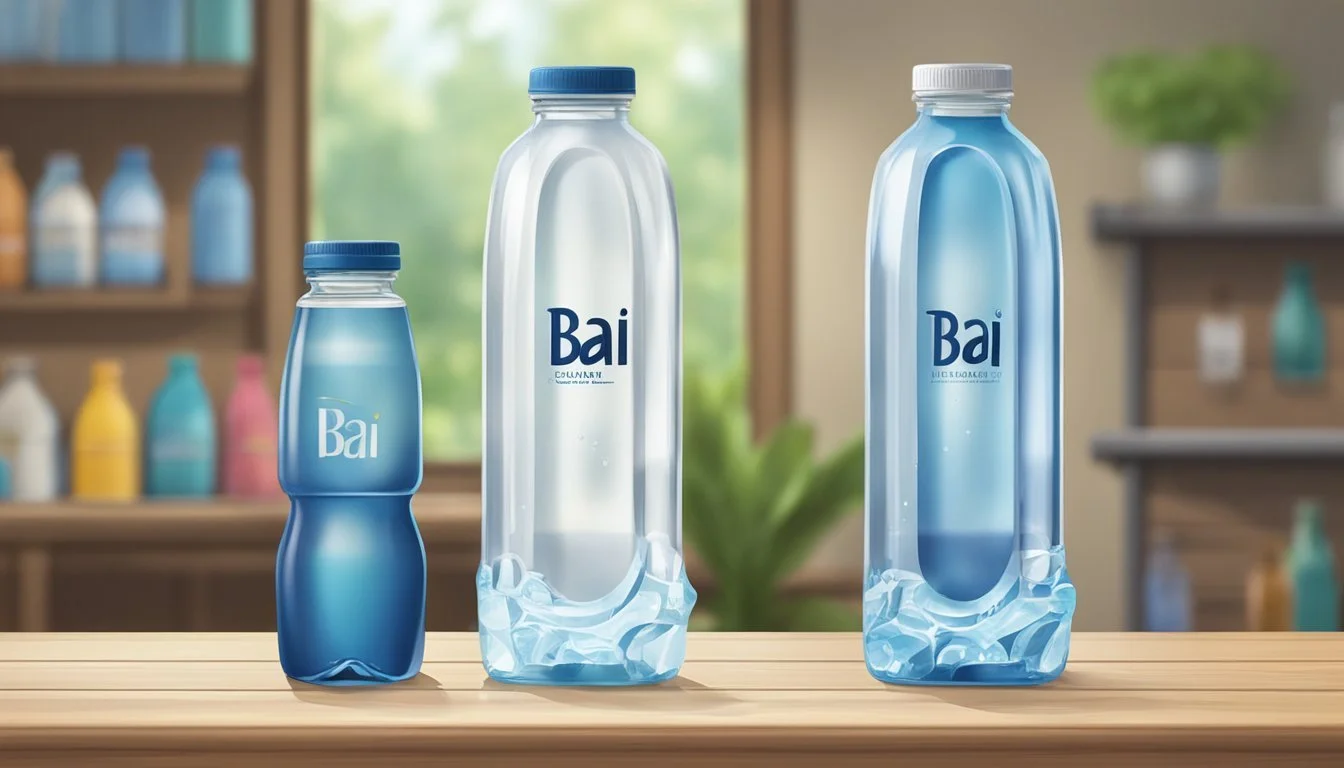Bai vs. Deer Park
A Comprehensive Comparison of Bottled Water Brands
When it comes to choosing bottled water, the market is saturated with various brands, each boasting unique sources and purported health benefits. Among the plethora of options, Bai and Deer Park stand out for their distinct profiles. Bai's water, marketed as infused with antioxidants, positions itself as a health-oriented beverage. It contains minimal sugar and calories, aiming to offer hydration with added health benefits from its coffee fruit extract and tea extracts.
Deer Park, a brand under the Nestlé umbrella, is known for its natural spring water sourced from the Eastern Seaboard. It prides itself on delivering a straightforward product that's both refreshing and free of additional ingredients. The brand emphasizes the purity of its water, highlighting the clean and crisp taste that comes from its natural sources.
The choice between Bai and Deer Park may come down to consumer preference for added health benefits versus pure, natural water. Bai offers a product with a health angle, appealing to those who seek more than simple hydration. Meanwhile, Deer Park is geared towards consumers looking for natural spring water without any added ingredients. Each brand caters to different needs, making the comparison a reflection of what consumers value most in their bottled water.
Overview of Bai and Deer Park
Bai and Deer Park offer distinct beverage choices with their unique histories and range of products. This section explores the origins and product offerings of both brands.
Brand Histories and Values
Bai prides itself on providing antioxidant-infused drinks with exotic fruit flavors. Its beverages are known to be low-calorie and sweetened with plant-based sweeteners. Bai emphasizes health and innovation in its beverages, aiming to appeal to health-conscious consumers.
In contrast, Deer Park has its roots firmly in natural spring water. Beginning in Deer Park, Maryland after the American Civil War, Deer Park water centers its brand on being 100% natural spring water. The brand has built a reputation for its pure and crisp-tasting spring water, emphasizing its connection to nature and environmental stewardship.
Product Range
Bai's product range includes:
Antioxidant-infused water
Supertea beverages
Bubbles, a sparkling antioxidant infusion
Cocofusion, tropical-inspired drinks
Deer Park, on the other hand, focuses on still and sparkling water. Its offerings include:
Natural Spring Water: Sourced from springs across the Eastern Seaboard and beyond
Sparkling Water: Available in a variety of natural fruit flavors
Both brands cater to different segments of the beverage market, with Bai leaning toward flavor and health benefits and Deer Park emphasizing the purity and simplicity of its water.
Water Source and Processing
In comparing Bai and Deer Park bottled waters, a distinct difference arises from their sources and how they are processed. Bai emphasizes its use of mineral-rich water, while Deer Park sources from natural springs and employs several filtration stages for purity.
Bai Water Source
Bai uses mineral enhanced water, which is sourced from municipally supplied water. This water undergoes a purification process that enhances it with minerals for a distinctive taste and hails from a consistent quality source.
Deer Park Water Source
Deer Park boasts a source of natural spring water, collected from protected areas across the Eastern Seaboard of the United States. These springs benefit from natural filtration through limestone which contributes to the water's purity and mineral content.
Purification Processes
Bai utilizes a multi-step purification process that includes reverse osmosis and added electrolytes to ensure the product achieves a high standard of cleanliness while maintaining a naturally enhanced mineral profile.
Deer Park, on the other hand, adheres to stringent purification standards. Their process often includes filtration through layers of sand and gravel, natural protection from lava rock, and various other cleansing steps to preserve the water's cleanliness and natural alkalinity.
Health and Hydration
When considering bottled water choices like Bai and Deer Park, consumers often assess two critical aspects: the nutritional content and hydration efficiency of the water. These factors contribute significantly to health and hydration.
Nutritional Content
Bai water, recognized for its flavored options, typically contains added ingredients like antioxidants and vitamins. It may also have electrolytes, enhancing the beverage's hydrating capability while providing a light taste profile. Deer Park, on the other hand, focuses on delivering natural mineral water with a balanced pH level. It provides essential minerals such as calcium, magnesium, and potassium, which are vital for overall health.
Components Bai Water Deer Park Water Electrolytes Usually added for taste and hydration Naturally occurring, varies by source pH Level Altered due to added ingredients Typically neutral, close to a pH level of 7 Minerals May be present depending on the flavor Contains essential minerals like Ca, Mg, K Additional Vitamins and antioxidants in flavored variants Pure, no additives
Hydration Efficiency
Hydration efficiency is determined by how well the water replenishes the body's fluids and electrolyte balance. Bai offers waters that are infused with electrolytes, which can be beneficial for quick hydration and restoration of bodily functions. Deer Park's mineral content not only supports hydration but also provides a slow and steady absorption of fluids, which is beneficial for prolonged hydration support.
Bai:
Targets efficient hydration with added electrolytes.
May include flavors that encourage increased water intake.
Deer Park:
Utilizes the natural mineral composition of its sources for optimal hydration.
Offers a pure water experience without added ingredients, supporting steady hydration.
Both Bai and Deer Park present different hydration qualities catered to varied health preferences and needs. Bai's enhanced water aims to facilitate immediate hydration needs, often infused with flavoring agents, while Deer Park offers a natural mineral water for sustained hydration over time.
Taste Profile Comparison
When comparing Bai and Deer Park bottled waters, one evaluates a spectrum from flavor-infused beverages to a natural water taste, each offering a distinctive drinking experience.
Bai's Flavor Portfolio
Bai's flavored water lineup is designed to offer a fruit-infused experience that deviates from traditional water, aiming to provide both hydration and a taste adventure. The flavors are bold and exotic, incorporating a variety of fruit essences, like Brasilia Blueberry and Malawi Mango, that are artfully blended to create an intense taste that's low in calories and free from artificial sweeteners. Bai's waters often include added antioxidants and natural caffeine, making them a multi-faceted choice for those seeking more than just hydration.
Key taste notes in Bai's water:
Fruit-infused
Exotic flavors
Bold taste profile
Deer Park's Natural Taste
Deer Park water takes pride in its 100% natural spring water which possesses a crisp and clean taste. Originating from various springs across regions like the Eastern Seaboard, it maintains a simple and pure flavor profile that reflects the quality of its source. The taste is often described as refreshing and invigorating, without the addition of flavors or enhancements, providing a straightforward water drinking experience.
Features of Deer Park's taste include:
Natural spring water
Crispness
Clean and refreshing
Packaging and Environmental Impact
Evaluating Bai and Deer Park bottled waters requires analyzing the materials used for packaging and their sustainability practices. The environmental impact is a significant factor, influenced by the choice of bottle materials and the effectiveness of recycling programs.
Bottle Materials
Bai uses plastic bottles that are PET 1 (Polyethylene Terephthalate), chosen for its lightweight and recyclable properties. They emphasize that their bottles are BPA-free, aligning with consumer health concerns over the potential leaching of harmful chemicals. Deer Park, a Nestlé brand, also utilizes PET plastic bottles for its water products. The materials for both brands are designed to be recyclable, in line with a growing industry standard to reduce environmental harm.
Recycling and Sustainability
Bai focuses on encouraging consumers to recycle their bottles. They participate in initiatives aimed at improving recycling rates and have efforts in place to inform consumers about proper disposal.
Deer Park, under the Nestlé umbrella, also promotes recycling, but their environmental impact extends to their sourcing practices. The company claims its spring water is 100% natural, drawing attention to sustainable sourcing alongside their advertising of clean and crisp water. Both brands’ impact on the environment is also determined by the carbon footprint associated with the production and transportation of their bottled water.
Consumer Preferences and Reviews
In the realm of bottled water, consumer preferences and reviews play a pivotal role in establishing the popularity and reception of a brand. They often reflect the drinking experience and are quantifiable through online ratings.
Drinking Experiences
Consumers typically describe Deer Park as having a "crisp and clean taste", suggestive of its natural spring water origins. The brand, under the Nestlé umbrella, emphasizes its 100% natural spring water, which appears to resonate positively with consumers looking for a refreshing drink experience.
Bai offers a different approach to bottled water by infusing it with antioxidant-rich ingredients and flavors. While some consumers prefer the taste and added benefits of these infusions, others may opt for the pure simplicity of traditional spring waters like Deer Park.
Online Ratings
When examining online ratings, both Bai and Deer Park receive a varied spectrum of feedback. Across different platforms, such as retailer websites and product review pages, Bai's flavored waters often attract those who appreciate a flavored, yet health-conscious beverage option. The brand's emphasis on low-calorie and exotic flavor infusions places it in a favorable position among a niche audience that values innovation in their hydration choices.
Deer Park, on the other hand, is consistently recognized for its quality as a straightforward bottled water choice. Online reviews generally reflect satisfaction among consumers who prefer unflavored, natural spring water. These reviews typically highlight the brand's commitment to a natural and refreshing product, contributing to its overall positive reputation.
Price and Accessibility
When comparing Bai and Deer Park bottled waters, consumers often consider price and accessibility pivotal factors. These aspects can greatly influence purchasing decisions, especially for those seeking hydration on the go or for household stocking.
Market Availability
Bai water is typically found in select supermarkets, health food stores, and online retailers. Its market penetration is significant within health-oriented consumer sectors, but it may not be as readily available in convenience stores or vending machines.
Deer Park, on the other hand, is widely accessible across many retailers, including grocery stores, gas stations, and vending machines. It benefits from the extensive distribution network of its parent company, Nestlé.
Cost Analysis
When it comes to cost, Bai water is generally positioned as a premium beverage. Prices can vary depending on the retailer, but it is usually more expensive than traditional bottled water due to its added antioxidants and flavor profiles.
Deer Park is considered more inexpensive and is a cost-effective choice for consumers. It provides a straightforward option for those seeking pure water without additional health claims or flavorings.
Brand Average Cost per Bottle Bai Higher-priced Deer Park More affordable
In summary, Deer Park offers a more accessible and budget-friendly choice for everyday hydration, while Bai caters to a niche market with a focus on added health benefits and unique flavors, reflected in its premium pricing.
Regulatory Compliance and Safety
When choosing between bottled water brands like Bai and Deer Park, consumers often prioritize regulatory compliance and safety standards. Each company's approach to adhering to FDA regulations and ensuring quality assurance is critical to providing safe, contaminant-free bottled water.
FDA Regulations
Bai and Deer Park must comply with the FDA's regulations for bottled water, which include standards for contaminants. The FDA classifies bottled water under the Federal Food, Drug, and Cosmetic Act (FFDCA), where it enforces limits on levels of certain contaminants. These contaminants include inorganic chemicals, organic chemicals, and microbiological contaminants.
Key FDA Standards for Bottled Water:
Microbiological Standards: The presence of harmful microorganisms is strictly regulated.
Chemical Standards: Limits are set for chemicals like lead, fluoride, and arsenic.
Radiological Standards: Regulations are in place to limit exposure to radioactive elements.
Quality Assurance
Both Bai and Deer Park have established quality assurance practices to ensure their bottled water meets safety standards before reaching the consumer. Typically, these include rigorous internal testing and often third-party verification.
Quality Reports:
Bai: It should publish reports detailing its water testing results, demonstrating compliance with all applicable regulations.
Deer Park: It should also produce similar quality reports, providing transparency about its water sources and the safety measures in place.
Safety Protocols:
Risk Assessment: Regular analysis to identify potential sources of contamination.
Monitoring and Testing: Continuous monitoring and testing of water sources and finished products for a range of contaminants.
Certifications: Seeking third-party certifications can further validate their commitment to safety.
Contaminants: Ensuring the safety of bottled water involves regular monitoring for contaminants, which can range from naturally occurring minerals to substances like PFAS chemicals. The brands should adhere to the FDA's stringent requirements to minimize these risks.
In summary, both Bai and Deer Park are obliged to abide by federal regulations that maintain the safety and quality of their bottled water products. Their conformity to these health standards ensures a reliable and safe product for consumers.
Conclusion
When comparing Bai and Deer Park, consumers must consider several factors including taste, ingredients, availability, and environmental impact.
Bai offers a range of flavored water products infused with antioxidants and vitamins. They tend to use natural sweeteners and have a variety of flavors. However, Bai is not just water; it's also a flavored beverage, which means it may contain calories and additional ingredients.
Deer Park, on the other hand, is known as 100% natural spring water. With its sources primarily in the Eastern Seaboard of the United States, Deer Park promotes a clean taste with no additional ingredients, presenting itself as a straightforward hydration option.
Aspect Bai Deer Park Main Offering Flavored water with additives Natural spring water Caloric Content Contains calories No calories Ingredients Antioxidants, vitamins, natural sweeteners Water only Taste A variety of flavored options Crisp and clean
In terms of availability, Bai may have a narrower distribution compared to Deer Park, which is a product of Nestlé, one of the largest bottled water companies in the world.
Environmentally speaking, consumers should consider the packaging and sources of both brands. Deer Park, being part of Nestlé, has faced scrutiny regarding environmental and community impact related to water sourcing.
In conclusion, if consumers are seeking flavored water with extra nutrients, Bai could be more suitable. For those prioritizing unflavored and pure water, Deer Park is a more fitting choice. Personal preference, purpose of consumption, and individual values all play a significant role in determining the better option.








